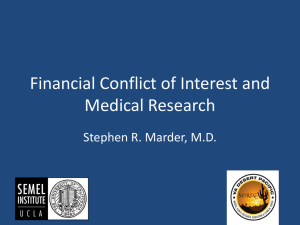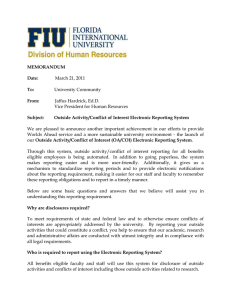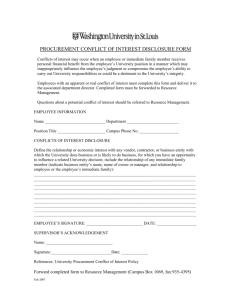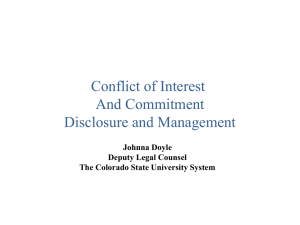Professional Standards and Business Conduct Conflicts of Interest and Commitment Purpose
advertisement
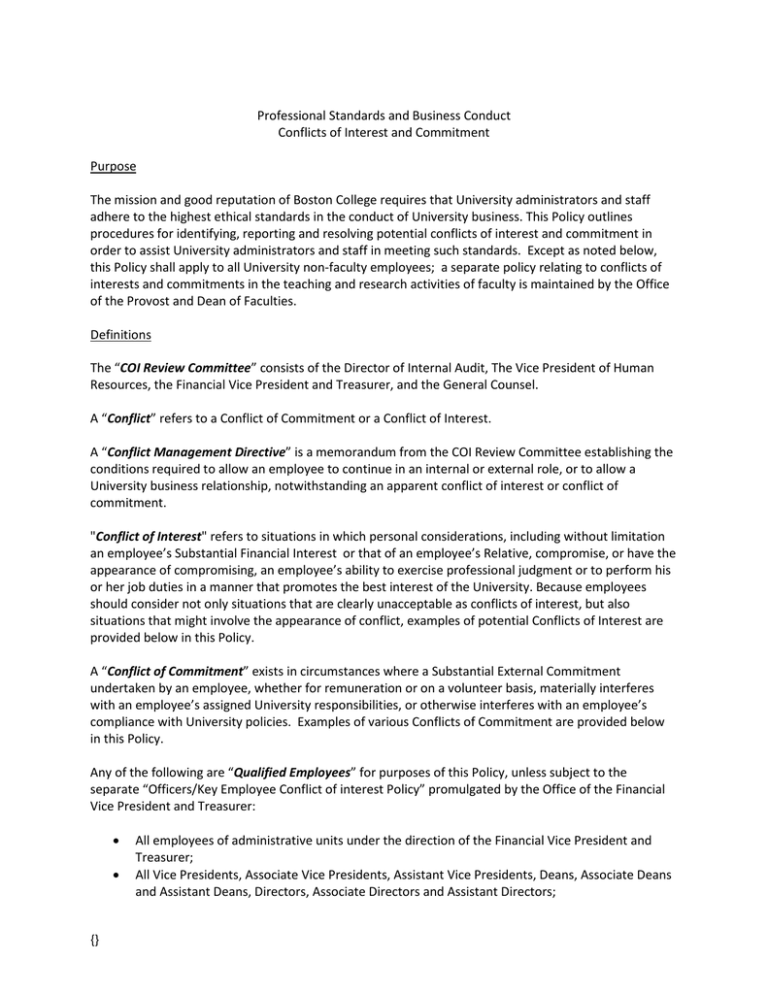
Professional Standards and Business Conduct
Conflicts of Interest and Commitment
Purpose
The mission and good reputation of Boston College requires that University administrators and staff
adhere to the highest ethical standards in the conduct of University business. This Policy outlines
procedures for identifying, reporting and resolving potential conflicts of interest and commitment in
order to assist University administrators and staff in meeting such standards. Except as noted below,
this Policy shall apply to all University non-faculty employees; a separate policy relating to conflicts of
interests and commitments in the teaching and research activities of faculty is maintained by the Office
of the Provost and Dean of Faculties.
Definitions
The “COI Review Committee” consists of the Director of Internal Audit, The Vice President of Human
Resources, the Financial Vice President and Treasurer, and the General Counsel.
A “Conflict” refers to a Conflict of Commitment or a Conflict of Interest.
A “Conflict Management Directive” is a memorandum from the COI Review Committee establishing the
conditions required to allow an employee to continue in an internal or external role, or to allow a
University business relationship, notwithstanding an apparent conflict of interest or conflict of
commitment.
"Conflict of Interest" refers to situations in which personal considerations, including without limitation
an employee’s Substantial Financial Interest or that of an employee’s Relative, compromise, or have the
appearance of compromising, an employee’s ability to exercise professional judgment or to perform his
or her job duties in a manner that promotes the best interest of the University. Because employees
should consider not only situations that are clearly unacceptable as conflicts of interest, but also
situations that might involve the appearance of conflict, examples of potential Conflicts of Interest are
provided below in this Policy.
A “Conflict of Commitment” exists in circumstances where a Substantial External Commitment
undertaken by an employee, whether for remuneration or on a volunteer basis, materially interferes
with an employee’s assigned University responsibilities, or otherwise interferes with an employee’s
compliance with University policies. Examples of various Conflicts of Commitment are provided below
in this Policy.
Any of the following are “Qualified Employees” for purposes of this Policy, unless subject to the
separate “Officers/Key Employee Conflict of interest Policy” promulgated by the Office of the Financial
Vice President and Treasurer:
•
•
{}
All employees of administrative units under the direction of the Financial Vice President and
Treasurer;
All Vice Presidents, Associate Vice Presidents, Assistant Vice Presidents, Deans, Associate Deans
and Assistant Deans, Directors, Associate Directors and Assistant Directors;
•
•
•
•
All staff of Boston College financial and administrative “Service Centers”;
All non-faculty employees that charge effort to grants sponsored by government agencies;
Any employee that has at any time disclosed a potential Conflict; and
Such other categories of employees as designated from time to time by the COI Review
Committee.
A “Relative” shall mean a spouse, a domestic partner, a financial dependent, a parent, or grandparent,
brothers and sisters (by whole or half-blood), children (including legally adopted children),
grandchildren, great grandchildren, and spouses of any of the above.
A Substantial External Commitment shall mean any obligation to an employer, to a social, charitable,
civic, or governmental board or organization, or to any other enterprise (but excluding Boston College)
that involves a time commitment regularly exceeding seven hours per week.
“Substantial Financial Interest” involves:
• an ownership or investment interest representing more than 1% of the outstanding shares of a
publicly traded company, or 5% of the outstanding shares of or comparable interest in a
privately owned company; or
• an ownership or investment interest not meeting the criteria above, but that produces a
significant amount of the annual income, or constitutes a significant part of the net worth, of
the person; or
• a compensation arrangement of any kind, including any such arrangements related to
employment, consulting or management roles.
Policy
University employees may not permit Conflicts of Interest or Conflicts of Commitment to interfere with
the faithful performance of their duties to the University, and should avoid the appearance of any such
conflicts. Any circumstances that may create a Conflict of Interest or a Conflict of Commitment should
be disclosed as soon as practicable to the University under the provisions set forth below in this Policy
whether or not such employee is required to submit annual disclosures. If, in the determination of the
COI Review Committee, such conflict can be managed through the issuance of a Conflict Management
Directive, such employee shall comply fully with the requirements of the Directive. In the event it is
determined that a reported conflict cannot be adequately managed, steps shall be taken to eliminate
the conflict.
Required Disclosures
All employees of Boston College are required to be familiar with this Policy and to disclose any potential
Conflict to the Director of Internal Audit as soon as practicable following their becoming aware of
circumstances giving rise to the possible Conflict. In addition, not later than the last day of October of
each year, each Qualified Employee shall acknowledge his or her familiarity with this Policy and
complete a Conflict Certification and Disclosure Statement, the current form of which is attached to
this Policy. Conflict Certification and Disclosure Statements shall be distributed annually to all Qualified
Employees by the Internal Audit Department. All Conflict Certification and Disclosure Statements shall
{}
2
be reviewed by the COI Review Committee in accordance with the requirements set forth below in this
Policy.
Review of Disclosure Statements
The COI Review Committee shall meet quarterly on or about the first day of March, June, September
and December to review Disclosure Statements. With respect to all Statements the Committee shall be
responsible to:
•
•
•
Determine whether a Conflict exists;
Determine whether a Conflict can be managed through implementation of a Conflict
Management Directive; and
Determine if the Conflict represents an unacceptable risk to the integrity of the
University and therefore must be terminated.
In the event the Committee determines that a Conflict can be managed through a Conflict Management
Directive, it shall outline the terms of such Directive and provide a copy of such Directive to both the
employee and his or her supervisor. All Conflict Management Directives shall outline a process for
confirming ongoing compliance and shall be reviewed annually by the COI Review Committee.
Each member of the COI Review Committee, and all employees responsible to monitor the terms of a
Conflict Management Directive shall hold in confidence all information contained in Disclosure
Statements, unless disclosure is required to protect the interests of the University or ordered by a court
or other legal process.
Annual Report of the COI Review Committee
The COI Review Committee shall issue an annual report to the Executive Vice President concerning its
activities. The report should:
•
•
•
Outline the terms of any newly issued Conflict Management Directives;
Disclose any material breaches of existing Management Conflict Directives of which it
is aware; and
Disclose any failure by Qualified Employees to submit an Annual Disclosure or to
complete the Annual Disclosure accurately.
Disciplinary Action for Failure to Comply with this Policy
Failure to disclose actual or apparent conflicts of commitment or conflicts of interest, or failure to
adhere to the terms of a Conflict Management Directive, can be a cause for disciplinary action, up to and
including termination by the University.
Examples of Conflicts of Interest
The following examples are provided to assist employees in understanding the variety of potential
Conflicts of Interest:
{}
3
Many conflicts arise in situations where an employee or an employee’s Relative has a Substantial
Financial Interest in firm engaging in, or seeking to engage in, business with the University. In such cases
an employee may compromise his or her duty to advance the best interests of the University by
influencing a decision, participating in negotiations, or entering into a contract, to purchase goods
and/or services for the University from such firm.
Similarly, in cases where an employee or an employee’s Relative has a Substantial Financial Interest in a
firm that is in a position to exploit privileged or confidential University information (e.g. research results,
or invention disclosures), such employee may compromise his or her duty to the University by
facilitating the disclosure of such information.
Conflicts of Interest can arise from personal circumstances that do not involve Substantial Financial
Interests. For example, acceptance of personal gifts or special favors from individuals or firms that
provide goods or services to the University (other than in nominal amounts otherwise permitted by
University policies) may create a Conflict of Interest. Even if without compensation, serving on a board
of a corporation that directly competes in some manner with Boston College may create the appearance
of a Conflict of Interest.
Examples of Conflicts of Commitment
The University recognizes that many of its employees serving in non-faculty positions have specialized
skills or areas of expertise, and that the utilization of these skills in Substantial External Commitments
can be beneficial to both the individual and to the University. Such activities may include, but are not
limited to: teaching and consulting; personal and/or professional involvement in the community, in
professional organizations, and in state or local politics; and any employment or employment-related
activities undertaken to supplement current income. Nevertheless, a full-time employee of Boston
College who undertakes Substantial External Commitments, whether for compensation or on a
volunteer basis, should not regularly engage in such activities during normal Boston College working
hours, or when otherwise on-duty to the University.
Conflicts of Commitment do not necessarily involved scheduling conflicts. Outside commitments may
present a Conflict of Commitment when they result in material unauthorized use of University
resources.
Approved: William P. Leahy, S.J.
Date:
June 4, 2014
{}
4
2015 CONFLICT OF INTEREST DISCLOSURE STATEMENT
Per the Conflicts of Interest and Commitment section of the Professional Standards and Business
Conduct, Conflicts of Interest and Commitment Policy, a conflict of interest refers to situations in which
personal considerations, including without limitation an employee’s substantial financial Interest or that
of an employee’s Relative, compromise, or have the appearance of compromising, an employee’s ability
to exercise professional judgment or to perform his or her job duties in a manner that promotes the
best interest of the University. Please read the Policy before completing the following questions.
1. Do you have authority over University funds or manage people with that authority?
□ No
□ Yes
If Yes, please describe in the space provided.
2. Do you have budgetary responsibilities (purchasing, PeopleSoft authorization, etc.)?
□ No
□ Yes
If Yes, please describe in the space provided.
3. Do you have responsibility for hiring vendors or buying products?
□ No
□ Yes
If Yes, please describe in the space provided.
4. Do you or any member of your family as defined by the Policy work for or have a financial,
employment, consulting or other business relationship, of which you are aware, with any
individual or organization that provides goods or services to the University?
{}
5
□ No
□ Yes
If Yes please describe in the space provided.
5. Do you or your relative as defined by the Policy have a substantial financial interest in firm
engaging in, or seeking to engage in, business with the University?
□ No
□ Yes
If Yes, please describe in the space provided.
6. Do you or your relative as defined by the Policy have a substantial financial interest in a firm
that is in a position to exploit privileged or confidential University information (e.g. research
results, or invention disclosures)?
□ No
□ Yes
If Yes, please describe in the space provided.
7. Have you or any family member accepted gifts or any other favors from individuals or firms
that provide goods or services to the University (other than in nominal amounts otherwise
permitted by University policies)?
□ No
□ Yes
If Yes, please describe in the space provided.
{}
6
8. Do you have or had any compensation arrangement with any firm that does or may do
business with the University?
□ No
□ Yes
If Yes, please describe in the space provided.
9. Are you holding a director, trustee of board committee position with any other firm that does
or may do business with the University?
□ No
□ Yes
If Yes, please describe in the space provided.
10. In your area of direct responsibility within the University, do you employ or supervise anyone
with whom you have a business or personal relationship?
□ No
□ Yes
If Yes, please describe in the space provided.
According to the Professional Standards and Business Conduct, Conflicts of Interest and Commitment
Policy, failure to disclose actual or apparent conflicts of commitment or conflicts of interest, or failure to
adhere to the terms of a Conflict Management Directive, can be a cause for disciplinary action, up to and
including termination by the University.
{}
7
I have read the Professional Standards and Business Conduct, Conflicts of Interest and Commitment
Policy, and I understand the concept of a conflict of interest and am familiar with the required disclosure by
affected employees of actual or potential conflict of interest situations. By clicking the “Submit’” button I
certify that the preceding information is true and complete. I acknowledge that I am supplying this
information for review by authorized University personnel.
________________________________
Name of Employee
________________________________
Position or Title
________________________________
Department
________________________________
Date
________________________________
Signature
{}
8

